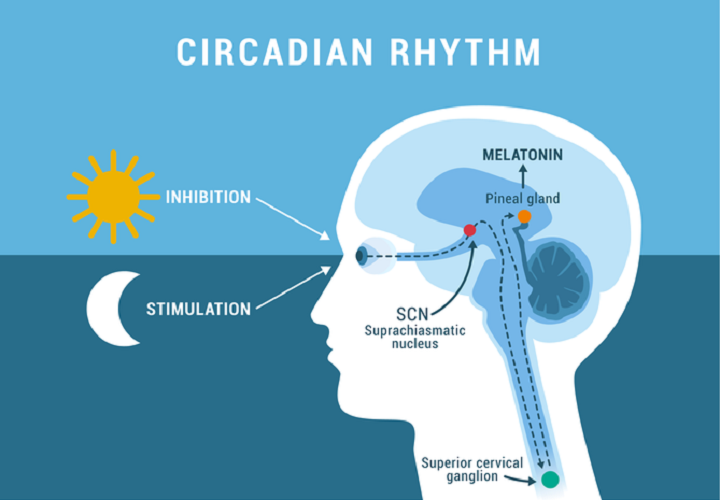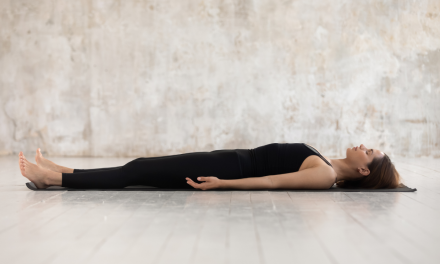In this article:
Get sunlight in your eyes first thing in the morning, bathe in darkness in the evening
Exposure to sunlight in the morning is so important, that the very sockets in our skulls that house our eyes were once solely meant to detect the rhythm of night and day. These natural light sensors played a pivotal role in the evolution of our circadian rhythm, aligning our ancestors’ activities with the rising and setting of the sun.

Sunlight, especially when it comes from above at a low angle, such as in the morning, suppresses the production of melatonin and increases the production of hormones that keep us alert, such as Acetylcholine. © Oklahoma Otolaryngology Associates, LLC
Circadian rhythm: what is it
Our circadian rhythm influences when we feel alert or sleepy. While this might seem inconsequential, how we feel plays a pivotal role in several vital processes:
- Learning:
- During the day, we accumulate memories of our experiences. At night, our brain decides which memories to retain and which to discard.
- This process not only helps us learn new tasks or languages but also gives meaning to our world, as it shapes the way we think and the way we look at the world. Acetylcholine (ACh), a critical neurotransmitter, is involved in this decision-making process.
- Optimal Acetylcholine levels enhance focus and alertness, crucial for effective learning. Events occurring during these times are more likely to be stored in long-term memory, shaping our perception and abilities.
- Disruptions in our internal clock due to altered circadian rhythms can impact Acetylcholine synthesis and release.
- Digestion:
- Acetylcholine contracts intestinal muscles, aiding food movement through the digestive system.
- It also increases stomach and intestine secretions, improving nutrient absorption.
- Heart Regulation:
- ACh regulates heart contractions, blood pressure, and heart rate.
- It helps counteract stress-induced high blood pressure and faster heart rates.
- Additionally, ACh activates the sympathetic system, part of our “fight or flight” response to handle threats.
- Alertness:
- Disrupted circadian rhythms can lead to irregular Acetylcholine release, impacting cognitive function and overall alertness.
Our internal clock affects more than just our sleep—it shapes our entire well-being!
How can we maintain a consistent rhythm throughout the year when the daylight hours vary significantly between summer and winter?
We humans are not inherently suited for life in northern latitudes. Consider capturing a polar bear and relocating it to a zoo in California. Will it survive? Most likely. Will it thrive? Probably not. Now, envision that this bear has offspring and nephews. These bears, born and raised in California’s warm climate, would find it entirely natural. But does this adaptation mean their bodies have changed to cope with the heat? Not really. Their physiology remains the same as that of their distant ancestors who roamed the North Pole.
Humans living in latitudes far from the equator are akin to the nephews of these bears. While we adapt to life in places like the UK, Norway, or Canada, our bodies haven’t had sufficient time to fully adjust to the new climate. For millions of years, our ancestors resided near the equator in North Africa. The climate there, at that time, was hot and humid, with lush vegetation providing plenty of food to gather. The rhythm of night and day was consistently close to 12 hours, regardless of the season. Although hominids like Neanderthals and Homo Erectus inhabited northern latitudes, we don’t descend from them. Our lineage traces back to a group of Homo sapiens who departed from northern Africa approximately 40,000 to 50,000 years ago. This migration likely occurred due to a climate change that ushered in a dry period, nearly pushing our ancestors to the brink of extinction. They explored the Middle East, moved toward India, and eventually settled in northern Europe only 20,000 to 15,000 years ago—a mere blink of an eye in evolutionary terms. Our bodies haven’t had ample opportunity to adapt to these relatively recent conditions.
For millions of years, humans thrived near the equator, where the consistent pattern of 12 hours of daylight and 12 hours of darkness sculpted our circadian rhythm.
This equatorial cradle of humanity fostered a rhythm that resonated with the environment, tuning our ancestors’ biological clocks to the steady tempo of a 24-hour day, teaching them to get up at first light, and go to sleep 16 hours after. The disruption of this rhythm through irregular sleep patterns, exposure to artificial light in the evening, and erratic lifestyles, leads to a cacophony of health issues:
- Sleep disorders
- Metabolic disturbances
- Memory issues
- Mental health problems
- Inability to focus and lack of energy
- Chronic inflammation and, therefore, age-related diseases such as diabetes or obesity.
Our selected brand for daylight therapy
Strategies to help fine-tuning your circadian rhythm
Fear not, for there are ways to realign our circadian rhythm with the natural world! Here are some strategies to help:
- Maintain a Consistent Sleep Schedule: Wake up every morning at the same time. Consistency reinforces your body’s internal clock.
- Morning Light Exposure: After waking up, seek exposure to natural light. You have a window of opportunity within the first 2 hours. If it’s still dark outside, consider using artificial lights. Opt for daylight-therapy lamps designed to mimic sunlight or powerful grow lamps (commonly used for indoor gardening). Remember not to look directly at the sun or artificial light; keep the light source to your side.

Picture by Lukasz Szczepanski
Dim Lights at Night: In the evening, dim artificial lights. Keep them low, close to the ground—similar to gathering around a campfire. The receptors for light are positioned inside the eye at a lower level, making light from below more effective. If it’s still light outside, close the curtains at least 1 hour before going to bed.
- Sunset Exposure: Observing the sunset is not only pleasant but also beneficial. Research shows that exposure to sunlight at sunset can reduce sensitivity to artificial lights in the evening.
- Morning Activity: Engage in physical activity or any habitual morning routine. For example, do brain training games on the phone. We are indeed creature of habits, and our body will prepare for the usual daily activities ay the usual time.
In short, let the grand maestro, the sun, dictate our rhythm once again, as it’s supposed to be. If you live far north, in areas where winter is very dark and the hours of light are less than 8-10, you’re living in a place very different from what you are evolved for. Here, technology comes to the rescue, and artificial lights mimicking the wavelength of sunlight will definitely be your best friends in the cold and dark Nordic winters.
In conclusion, our circadian rhythm is a testament to the incredible adaptability and resilience of the human body. We are part of the world and we breath at the rhythm of nature, like it or not. By understanding and respecting this natural pace, we can enhance our health and live in greater harmony with the world around us, which pulses within us all!
Now, that you have read about nutrition, check out other ways of being healthy and young at any age by reading our article:
The 10 most efficient, scientifically proven habits to stay young and fit at any age
Disclaimer
Consult a health professional before making significant changes to your diet, exercise routine, or supplement regimen. The information provided in this blog is intended to convey the latest scientific research in an accessible manner. However, it does not replace the advice of a medical professional. Take your health conditions into account and consult a qualified healthcare provider to ensure that the decisions you make are safe and appropriate for your specific health needs. Ultimately, you are responsible for your own health and well-being.






